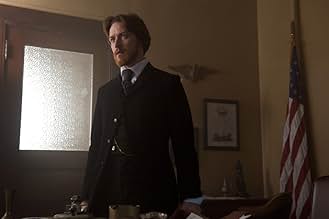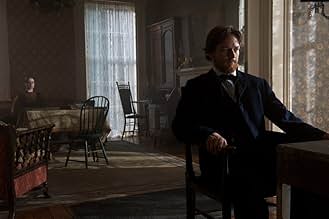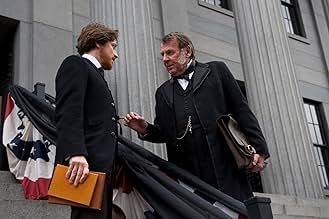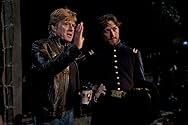Mary Surratt ist die einzige weibliche Angeklagte im Prozess um das Attentat auf Abraham Lincoln. Während sich die Nation gegen sie wendet, verlässt sie sich auf ihren Anwalt, um die Wahrhei... Alles lesenMary Surratt ist die einzige weibliche Angeklagte im Prozess um das Attentat auf Abraham Lincoln. Während sich die Nation gegen sie wendet, verlässt sie sich auf ihren Anwalt, um die Wahrheit aufzudecken und ihr Leben zu retten.Mary Surratt ist die einzige weibliche Angeklagte im Prozess um das Attentat auf Abraham Lincoln. Während sich die Nation gegen sie wendet, verlässt sie sich auf ihren Anwalt, um die Wahrheit aufzudecken und ihr Leben zu retten.
- Auszeichnungen
- 2 Gewinne & 3 Nominierungen insgesamt
Empfohlene Bewertungen
Since the whole story is told from his point of view, it emerges as a realistic depiction of how events might have unfolded, taking no firm stand on the innocence or guilt of the accused. As the nation mourns the sudden death of its leader taken from them just as the Civil War ended, we are told that justice must be swift to heal the wounds of the public and satisfy a thirst for revenge. It's that viewpoint that makes this film relevant today, in view of other controversial historical events, but first and foremost the assassination of President John F. Kennedy in 1963.
One glaring quibble: Apparently, to fully immerse the viewer in this time of history and to suit the flavor of the grim tale, Redford has chosen to use very muted color photography so that this is almost a sepia tone experience. But do we have to be reminded so flagrantly that this was the candlelit era? Scenes outside of the courtroom could have used flashes of real color, as could the social circle interiors of other scenes instead of keeping the low-key lighting so constant. It became a distraction for me. He may as well have used glorious B&W.
Other technical aspects are fine and the background score is effective without becoming overwhelming. ROBIN WRIGHT PENN plays Mary Surratt with quiet dignity and strength. KEVIN KLINE is almost unrecognizable as the stubbornly determined EDWIN STANTON seeking quick justice, EVAN RACHEL WOOD is effective as the distraught daughter Anna Surratt, and JOHNNY SIMMONS is sobering as the accused woman's son who manages to escape imprisonment for his role in the John Wilkes Booth caper. His character, unfortunately, isn't fleshed out at all.
Biggest supporting role goes to TOM WILKINSON as the man who urges McAvoy to take the defense case against his wishes. He and McAvoy share most of the running time on screen and do magnificent jobs.
History buffs will no doubt find this more interesting than the average movie fan looking for a more adventurous look at the past, but despite flaws, it is competently made and does recreate the actual events in a satisfying manner by use of flashbacks and an intelligent script. But did it have to be so dark?
This film focuses on the trial and aftermath of the Lincoln assassination and most particularly on Mary Surratt at whose boardinghouse in Washington, DC, John Wilkes Booth and his curious band of conspirators met and plotted. One of those was Mary's son John who was the only one to escape apprehension.
The villain in the film is Secretary Of War Edwin M. Stanton played by Kevin Kline. It was not hard for him to do what he did, he certainly had public approval. The assassinated president Abe Lincoln had suspended the right of habeas corpus during the war, so this trial by military tribunal was not an unforeseeable step that Stanton would take. It is important to remember that at the time we actually were at war with Confederate Armies still in the field. Lee surrendered to Grant at Appomattox five days before the assassination, but Joe Johnston was in the field and when it is announced that the last Confederate Armies have surrendered the day of the hanging, they are referring to Richard Taylor's troops in Texas.
James McAvoy is a young army veteran and lawyer who becomes Mary Surratt's lawyer. In the end he believes in her innocence, but the forces of vengeance are too much for him to overcome. And while Surratt might not have been as innocent as the film makes out, no case beyond reasonable doubt was proved at least by the rules of any civil trial that should have taken place.
The film really belongs to Robin Wright as the implacable and fatalistic Mary Surratt. She definitely merits some Oscar consideration next year. Up there on the screen she becomes everyone's mother and one wonders about Johnnie Simmons as John Surratt seen in flashback as to why he isn't coming to the plate on this.
Perhaps because even Stanton was afraid of public opinion if two Surratt women were in custody on trial for their lives daughter Anna Surratt played by Evan Rachel Wood was never charged. She must have had some knowledge of what was going on. One aspect of the story I think Redford missed and I'm surprised as he's an actor and matinée idol back in the day himself. John Wilkes Booth though his southern sympathies were well known though his plotting a secret, was the great matinée idol of his day. And he certainly attracted his fair share of what would be called groupies back in the day. I think he probably favored Anna Surratt and certainly John Surratt was glad to be included in his entourage. Put in those terms the relationship becomes clearer.
Still Redford has crafted a justly well received film and it will no doubt lead to talk about the rights of the accused of the worst kind of crimes.
Stealthily entering the President's box, Booth shoots Lincoln in the head, then leaps onto the stage shouting "sic semper tyrannis" (thus always to tyrants), and escapes on horseback. The assassination results in an outpouring of grief all over the country, and prompts the Secretary of War, Edwin Stanton (Kevin Kline) to vow revenge against the conspirators. After a two week search, Booth is found hiding in a nearby barn and shot to death, while seven suspected co-conspirators are arrested including Mary Suratt. Suratt is tried by a military tribunal where the rules state that only a majority vote is required for a guilty verdict and a two-thirds vote is needed to sentence a defendant to death. It is a court where a defendant is prohibited from testifying in their own defense.
Senator Reverdy Johnson (Tom Wilkinson) from Virginia and a former U. S. Attorney General agrees to defend Suratt on the grounds that she is innocent until proved guilty. The Senator, however, withdraws because he fears that being a Southerner might prejudice his case, and asks Frederick Aiken (James McEvoy), a northern attorney to defend her. Initially reluctant and dubious about her story, Aiken resolves to prove her innocence after seeing that the defendant was up against an overbearing prosecutor (Danny Huston), a biased head of the tribunal (Colm Meany), and the behind-the-scenes antagonism of Secretary Stanton.
At great cost to his personal life, Aiken tries to prove that Ms. Suratt knew the boarders who lived in her house, but was not involved in their conspiracy. As the case progresses, it becomes apparent that only her son John (Johnny Simmons), a known conspirator who fled to Canada, can save his mother by surrendering. While there is limited dimension to the characters, The Conspirator is true to the historical record and the film presents its message in a clear and powerful way. Redford, long a champion of civil liberties, implicitly reminds us that the Fifth Amendment to the U.S. Constitution expressly guarantees that "no person shall be deprived of life without due process of law" and provides no exception for war.
It is not only an important message for those unfamiliar with our nation's history, but is strikingly relevant to the present day in which hundreds of detainees at Guantanamo still languish in prison without trial, where a U.S. citizen, suspected of terrorist activities, is targeted for an assassination attempt without having been charged with, let alone convicted of, any crime, and where the ideal of due process and the presumption of innocence is slowly being replaced by unlimited violence, the repudiation of legality, and the undermining of democracy.
Wusstest du schon
- WissenswertesThe Surratt boarding house still stands in Washington, DC's Chinatown.
- PatzerWhen Booth is trapped and killed, he still has his distinctive mustache. He shaved his face soon after he killed Abraham Lincoln, to make himself less recognizable.
- Zitate
Edwin Stanton: Young man... always indebted to you for your courage in the field, but you must learn to tread lightly.
Frederick Aiken: Tread lightly? I will not tread lightly. You have predetermined her fate.
Edwin Stanton: Mary Surratt's fate rests entirely with the Commission. My concern is preserving our Union.
Frederick Aiken: Why did I fight for the Union if my rights aren't assured? You tell me.
Edwin Stanton: Fine words for rallying the troops, not for running a nation. They assassinated our president, and someone must be held accountable. The people want that.
Frederick Aiken: It's John Surratt you want. You don't even want Mary.
Edwin Stanton: I'll settle for either one.
- VerbindungenFeatured in The Conspirator: Mary Surratt and the Plot to Kill Lincoln (2011)
Top-Auswahl
Details
Box Office
- Budget
- 25.000.000 $ (geschätzt)
- Bruttoertrag in den USA und Kanada
- 11.538.204 $
- Eröffnungswochenende in den USA und in Kanada
- 3.506.602 $
- 17. Apr. 2011
- Weltweiter Bruttoertrag
- 15.625.544 $
- Laufzeit
- 2 Std. 2 Min.(122 min)
- Farbe
- Sound-Mix
- Seitenverhältnis
- 2.39 : 1











































